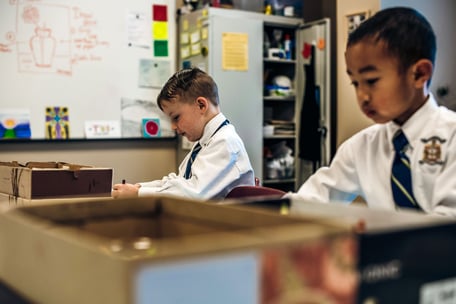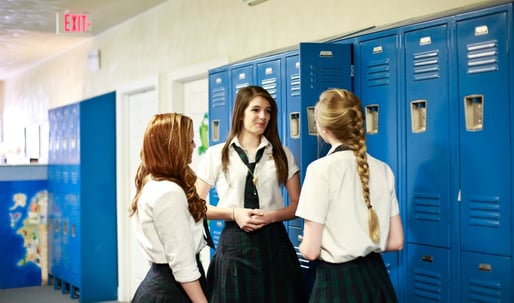 Bible: The students will learn Bible basics – the plan of salvation, the Books of the Bible in order, the major events of biblical history and the theological importance of these events. Our biblical studies teach the following:
Bible: The students will learn Bible basics – the plan of salvation, the Books of the Bible in order, the major events of biblical history and the theological importance of these events. Our biblical studies teach the following:
English: We seek to: (1) equip every student with the skills necessary for good writing, including spelling, grammar, style, clarity, etc.; (2) put a major emphasis on good writing by requiring the students to write often and correctly in each subject area; (3) encourage clear thinking by the students through requiring clear writing; (4) introduce the students to many styles of writing using the Bible and other high quality literature.
History and Geography: We seek to: (1) teach the students that God is in control of History and He will determine its ultimate outcome; (2) enable the students to see God's hand in the history of the world and the United States; (3) broaden the students' understanding of history and geography as the students mature; (4) specifically, begin with local history and geography in first grade and sequentially expand the scope of studies to the world; (5) make history and geography "come alive" for the students through the use of many forms of information and research, e.g. biographies, illustrations, field trips, guest speakers, music, art, foods, and architecture, etc.; (5) give the students a thorough understanding of Western Civilization; its distinctive, great leaders, great movements, and great thinkers; and also its particular involvement in the growth of Christianity.
Mathematics: We seek to: (1) ensure that the students have a thorough mastery of basic mathematical functions and tables; (2) put an emphasis on conceptual, as well as practical understanding of Mathematics through the frequent use of story problems; (3) illustrate God's unchanging character through the timeless, logical mathematical systems He gave to man through His gift of reason.
The ideal progression of a student’s Mathematics courses would start with the successful completion of Saxton Math 1 curriculum in Kindergarten, Saxton Math 2 in First Grade, followed by Saxton Math 3 in Second Grade, then progressing through Saxton 5/4 in Third Grade, Saxton 6/5 in Fourth Grade, Saxton 7/6 in Fifth Grade, and Saxton Math 8/7 in Sixth Grade. At the end of First Grade, each student will be evaluated to determine if they should repeat Saxton Math 2 or progress to Saxton Math 3.
All Lower School Mathematics classes and Upper School Mathematics Course Saxton Math 8/7 are scheduled at the same time to enable students to be placed in the match class that best matches their ability without affecting the remainder of their schedule. This enables students to pursue advanced Mathematics courses in high school, as desired.
Reading: We seek to: (1) use phonics as the primary building blocks for teaching students to read; (2) encourage the students to read correctly as soon as possible (normally in Kindergarten or first grade); (3) introduce the students to high quality children’s literature as soon as possible, through our Literature program; (4) carefully monitor the student's reading abilities to ensure that he comprehends adequately, and is reading fluently, both orally and silently, including the proper use of word-attack skills; (5) foster a life-long love of reading and high quality literature, after being taught to recognize the characteristics of such literature.
Art: We seek to: (1) teach all our students the basic fundamentals of drawing to enable them to create adequate renderings; (2) encourage the students to appreciate and imitate the beauty of the creation in their own works; (3) introduce the students to the works of the master artists of Western culture (4) equip the students to knowledgeably use a variety of art media.
Omnibus: Omnibus is the Latin phrase meaning "all encompassing" or everything. At Veritas, this means we read many of the Great Books of Western civilization, covering the subjects of literature, history, and theology - the "everything" from the culture of our ancestors. The ideas from these books have survived the centuries, and we explore and discuss them in the Omnibus classroom.

The student will know the basics of theology. Special concern will be given to the doctrine of Scripture and students will be taught that the every word of the Bible was inspired by Holy Spirit of God and is therefore the ultimate rule of all Christian belief and practice. Students will also learn sound principles of biblical interpretation and gain an understanding of Latin Finally, students will study a broad breadth of theology touching on the topics of God's creation, the nature of Christ, and church history. In this, all instruction will be consistent with the school’s statement of faith and each student will always be challenged to apply the truth of God to his own life.
The student will be able to become familiar with the common cultural consensus of our western world: that body of thought, belief, and imagination that all educated people in the western world share in common, and with which we must be familiar in order to understand, participate in, and exercise an influence over our culture. A student will also be given a context for understanding other types of studies since the great ideas in all areas of knowledge find their popular expression in literature. Finally, students will be enabled to appreciate the beauty of language and literature which is a critical part of the complete Christian life: not only does Scripture frequently convey truth in poetry, image, and symbol, but God has made us to desire and need beauty; consequently, we must learn to discern kinds and qualities of beauty in order to glorify Him in our aesthetic life, and exposure to great literature is one of the best means to do so.
The student will be able to discern the providential acts of God and the student's covenantal identity with men who have gone before him: identity with men of his culture, of his nation, of his family, and most importantly, of the people of God. The student will also receive both encouragement and warning from the actions of his forebears, and from the consequences of their actions. From this study our aim is that, the student would gain wisdom: to avoid the sins of the past, to improve upon the thinking of his forefathers, and to instill godliness in future generations.
Omnibus class sequence is:
|
7th Grade |
Omnibus I |
Ancient history & literature thru 70 A.D. |
|
8th Grade |
Omnibus IIA |
Medieval history & literature, 100-1400 A.D. |
|
9th Grade |
Omnibus IIB |
History & literature of the Renaissance, Reformation & Enlightenment, 1400-1700 AD |
|
10th Grade |
Omnibus IIIA |
American history and literature from Colonization through the American Civil War |
|
11th Grade |
Omnibus IIIB |
American history and literature from Reconstruction through Modern Times |
|
12th Grade |
Omnibus IV |
Ancient history through early medieval period |
Rhetoric: The student will be able to persuade others in a God-glorifying manner. He will also be able to winsomely give a reason for the hope within him. He will master the basics of formal rhetoric and then perfect his skill by constant practice in all of his classes. This will culminate in the writing and defense of a thesis paper during the Junior and Senior years with a formal presentation defense of the thesis given before a panel of college professors at a local university in their senior year. In addition, opportunity exists for those to travel to Eastern Europe, Slovak Republic, and present their thesis to the International Baccalaureate (IB) students as well.
Classical Language: The student will be able to read the New Testament, the writings of the Church Fathers and the great works of antiquity in the original. A student will also be enabled to master the English language. The study of classical language will also help the student to more deeply grasp English grammar and more quickly learn modern foreign languages.
Mathematics The student will master the basic operations of mathematics with all types of numbers. The student will also be able to solve complex equations for a variable and then for numerous variables (i.e. Algebra I, Algebra II, and Calculus). The students will be able to do the proofs of Geometry and will also be able to solve problems using trigonometric functions. In all of this, a student will be taught to glorify the God of all order for the order that is in nature.
Reading: For the student who studies modern foreign language, Veritas Christian Academy has these objectives. Firstly, the student will be able to communicate with people of other nationalities. Secondly, the student will accomplish this by gaining mastery of the language’s grammar and syntax. Thirdly, they will also be enabled to interact with and enjoy literature written in that language and other cultures.
Sciences: The student will be able to distinguish God’s glory by gazing at His creation. The student will become acquainted with the system of inductive thought (learning by using the scientific method—experimentation). The student will gain an understanding of science in general, the science of life (biology and anatomy & physiology), chemistry, and physics.
|
7th Grade |
Credits |
|
Credits |
|
Omnibus I |
0 |
Logic I |
0 |
|
Math 87 or Pre-Algebra |
0 |
Composition 1 |
0 |
|
General Science |
0 |
Art 7 |
0 |
|
Latin I |
0* |
Colloquy |
0 |
|
8th Grade |
Credits |
|
Credits |
|
Omnibus IIA |
0 |
Logic II |
0 |
|
Pre-Algebra, Algebra I or Geometry |
1** |
Composition 2 |
0 |
|
Physical Science |
0 |
Music 8 |
0 |
|
Latin II |
0* |
Colloquy |
0 |
|
9th Grade |
Credits |
|
Credits |
|
Omnibus IIB |
2 |
Latin III |
1 |
|
Algebra I, Geometry, or Algebra II |
1 |
Spanish I |
1 |
|
Biology |
1 |
Elective |
1 |
|
Rhetoric |
1 |
Colloquy |
0 |
|
Physical Education |
1*** |
|
|
|
10th Grade |
Credits |
|
Credits |
|
Omnibus IIIA |
2 |
Spanish II |
1 |
|
Geometry, Algebra II, or Pre-Calculus |
1 |
Writing 10 |
1 |
|
Chemistry / AP |
1 |
Elective |
1 |
|
Latin IV |
1 |
Colloquy |
0 |
|
Physical Education |
1*** |
|
|
|
11th Grade |
Credits |
|
Credits |
|
Omnibus IIIB |
2 |
Junior Thesis |
1 |
|
Algebra II, Pre-Calculus, Adv. Calculus |
1 |
Apologetics |
1 |
|
Anatomy & Physiology or Physics |
1 |
****Elective |
1 |
|
Spanish III |
1 |
Colloquy |
0 |
|
12th Grade |
Credits |
|
Credits |
|
Omnibus IV |
2 |
Senior Thesis |
1 |
|
Pre-calculus or Calculus / AP Calc. |
1 |
Elective |
1 |
|
Anatomy & Physiology or Physics / AP |
1 |
*Elective |
1 |
|
Spanish IV |
1 |
Colloquy |
0 |
Calendar